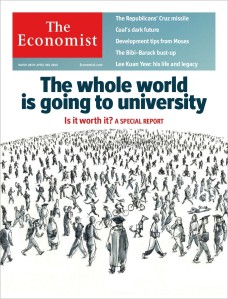When it comes to Indian universities and the degrees they give, where should the discussion even begin?
To be sure our Universities are about learning and teaching, but equally important is certification. Indeed, one would not be blamed if one thought that for the most part, the main aim of our Universities seems to be to hold examinations and then award (or deny) degrees. At the (somewhat limited, I now realize) universities I have taught at, the degrees were few: Ph D, MA, MSc, M Phil, M Tech, MPH, MCA, MBA, MFA, BSc. Maybe a few more. I don’t know if there is this level of bureaucracy in other countries, but the link on the UGC website of the list of recognized degrees is instructional. (As is their list of Fake Universities, but that is grist for another post!)
 As a matter of fact there are more than 160 different types of degrees (and many many more if one includes the varied flavours of specializations) that are awarded by our 700 Universities. Some of the nomenclature is fascinating and revealing of the deep love of minutiae that our academic administrators have. The 3 year degrees BHM (Bachelor of Hotel Management) or BHMTT (Bachelor of Hotel Management, Travel and Tourism) is distinct from the 4 year BHTM (Bachelor of Hotel and Tourism Management), for instance. And one can even earn the MHRD, the Masters in Human Resource Development in 2 years, but it can take 4 for the Masters in Optometry.
As a matter of fact there are more than 160 different types of degrees (and many many more if one includes the varied flavours of specializations) that are awarded by our 700 Universities. Some of the nomenclature is fascinating and revealing of the deep love of minutiae that our academic administrators have. The 3 year degrees BHM (Bachelor of Hotel Management) or BHMTT (Bachelor of Hotel Management, Travel and Tourism) is distinct from the 4 year BHTM (Bachelor of Hotel and Tourism Management), for instance. And one can even earn the MHRD, the Masters in Human Resource Development in 2 years, but it can take 4 for the Masters in Optometry.
There is a serious need to rethink much of this. Love of diversity apart, there is no reason to have such a set of whimsical and distinct degrees. For one, there is inconsistency in the durations. Bachelors degrees can take 5 years (e.g. Planning), 4 years (BMM, Bachelor of MultiMedia, Bachelor of Clinical Optometry, or the BHTM mentioned above), 3 years (the bulk of them, BA, BSc, BCom, etc.), or even 2, as the newly restructured Bachelor of Education will be. Masters level degrees are even more of a zoo- while most do take 2 years like the MA, MSc, or MCom, there are the 3 year MSc Tech. degrees and the 4 year Master of Optometry, MO.
 Careers should have primacy when these degrees are being thought about- quite frankly most of us do not have the luxury of doing degrees that do not lead to a real qualification, namely something that makes a real eligibility for a job. The degrees that lead to nothing except the next degree are the worst offenders, and of these, the M. Phil. is by far the least enabling. Once upon a time (and it does seem like a fairy-tale) the M. Phil. had consequence and meaning, but today, for the most part, it is not much more than “time-pass”. There is no job that requires an M. Phil. and nothing more, and the only thing the M. Phil. makes one eligible for is the Ph. D. But admission to the Ph. D. does not need the M. Phil., making it a sufficient but quite unnecessary degree…
Careers should have primacy when these degrees are being thought about- quite frankly most of us do not have the luxury of doing degrees that do not lead to a real qualification, namely something that makes a real eligibility for a job. The degrees that lead to nothing except the next degree are the worst offenders, and of these, the M. Phil. is by far the least enabling. Once upon a time (and it does seem like a fairy-tale) the M. Phil. had consequence and meaning, but today, for the most part, it is not much more than “time-pass”. There is no job that requires an M. Phil. and nothing more, and the only thing the M. Phil. makes one eligible for is the Ph. D. But admission to the Ph. D. does not need the M. Phil., making it a sufficient but quite unnecessary degree…
There are other degrees in fringe subjects given by mainstream (or any) universities. Can one still get a degree in Oriental Learning? Who does, and where? Is there really such a thing as a Ph. D. in Astrology? What would the point be? It is telling that the bulk of these unusual subjects get taught in one or the other of the “Deemed-to-be” Universities, but there are still many, like the Bachelor of Homoeopathic Medicine and Surgery or BHMS, for instance that is taught at at least one major central university and many state universities. Homoeopathic Medicine is bad enough, but Homoeopathic Surgery? And a Bachelor of Technology in the Humanities? Really?
These degrees sound like subtle ways of trapping the gullible. What jobs are the holders of such degrees entitled to at this time? This is something that the MHRD and the UGC need to seriously think about. But more, why should it take a minimum of 8 years to become an Masters level qualified optometrist, and only 5 for an MBA or an MBBS? And 4 to be a qualified Engineer, or 6 if one wants an M. Tech.? And why should anyone who wants to be a schoolteacher have to now spend 5 years (three years for BA/BSc/BCom + the two year BEd) when earlier it was 4? Rather than number of years, it would seem better to ensure that the person is properly qualified through a reliable certification.
 In a more responsible setting, university degrees should not need to carry a warning label or a “best before date”. But reputations take a while to grow, and the public at large need not always be vigilant. I have had close friends fall victim to spectacularly fraudulent instances like that of the Rai University that finally hit the newspapers, but there are scores of other examples of degrees that have little or no value and institutions that advertise extensively have a way of attracting clientele who find out much too late if at all. There is something to the plea of the Minister for HRD that they should be allowed to close down institutions that are of poor quality.
In a more responsible setting, university degrees should not need to carry a warning label or a “best before date”. But reputations take a while to grow, and the public at large need not always be vigilant. I have had close friends fall victim to spectacularly fraudulent instances like that of the Rai University that finally hit the newspapers, but there are scores of other examples of degrees that have little or no value and institutions that advertise extensively have a way of attracting clientele who find out much too late if at all. There is something to the plea of the Minister for HRD that they should be allowed to close down institutions that are of poor quality.
As I remarked in an earlier post, there is nothing very Indian about our Universities, so adopting some of the practices of others might serve us well. Especially since those practices come after a sufficiently long period of incubation and evolution. One practice that needs to become more widespread is to focus more on outcomes (rather than what the certificates say) by having an independent qualifier. Even our much vaunted technical education is wanting in this regard: just three years ago, 83% of our engineers were found through a survey to be “unfit for employment“, unfit in communication skills, confidence, presentation, problem-solving capabilities and generic abilities. And who can guarantee that holders of other degrees are not similarly wanting, especially when there is no attention being paid to the effectiveness of either the teaching or the learning.
There is an argument that for most Indians, entering the workforce earlier is preferable. By age 24 rather than 25 or older. And given that school leaving is at 18 for the bulk, it would make sense to keep outcomes in mind rather than just the degrees and their historical antecedents. There would be some merit, therefore, in merging, as far as possible and across the board, bachelors and masters degrees and shortening the overall duration, while ensuring that the training quality is independently assessed.
In the past few years, there has been some public debate on these issues, largely as a consequence of Delhi University’s decision to first introduce and then withdraw a four year undergraduate program, the FYUP. Given the fact that the bulk of the undergrad programmes in DU were for 3 years and many of these had related Master’s level courses for 2 years, shifting from a 3+2 scheme to a 4+2 scheme put in an additional strain on the infrastructure, not to mention an additional financial burden on students. Making the Masters just 1 year after the 4 year undergraduate degree was unacceptable to even DU dons, and in any case it would kill movement between Universities. The obvious solution, which is to make the Masters redundant by merger of the bachelor and the master degrees was not even considered. This would have been truly innovative and would have been widely supported if done properly.
Whims, as a Professor of History from DU wrote in a recent op-ed in The Hindu, be they of vice chancellors, or of teachers, or, as was true in this particular case, one mandarin and his minister, should not rule the fate of university education. The running thread of irony apart, there is much to agree with in the editorial, but the suggestion that “it is time that an Education Commission consisting of experienced and respected academics and educationists was set up to take stock of the state of our universities and to seriously deliberate on what needs to be done to improve the quality of education that they impart” is too little, although not too late.
The higher education landscape is changing faster than ever, what with widespread access to the internet, MOOCs and so on. Degrees may well become redundant soon- when students can learn specific subjects on the net, and from teachers across the world. Whether these offer solutions to us or not, the present policies of higher education do not appear to recognise the existing realities, or for that matter, to respect them.
Many changes need to be made urgently to the pattern of higher education, to rationalize the degrees and to ensure that university education is of value. A new and modern Education Commission is essential to bring these changes about.
The verse quoted at the beginning of this post is from The Ladder of St Augustine by Longfellow (an additional benefit of my Catholic schooling). In closing, the poem’s final stanza is apposite:



